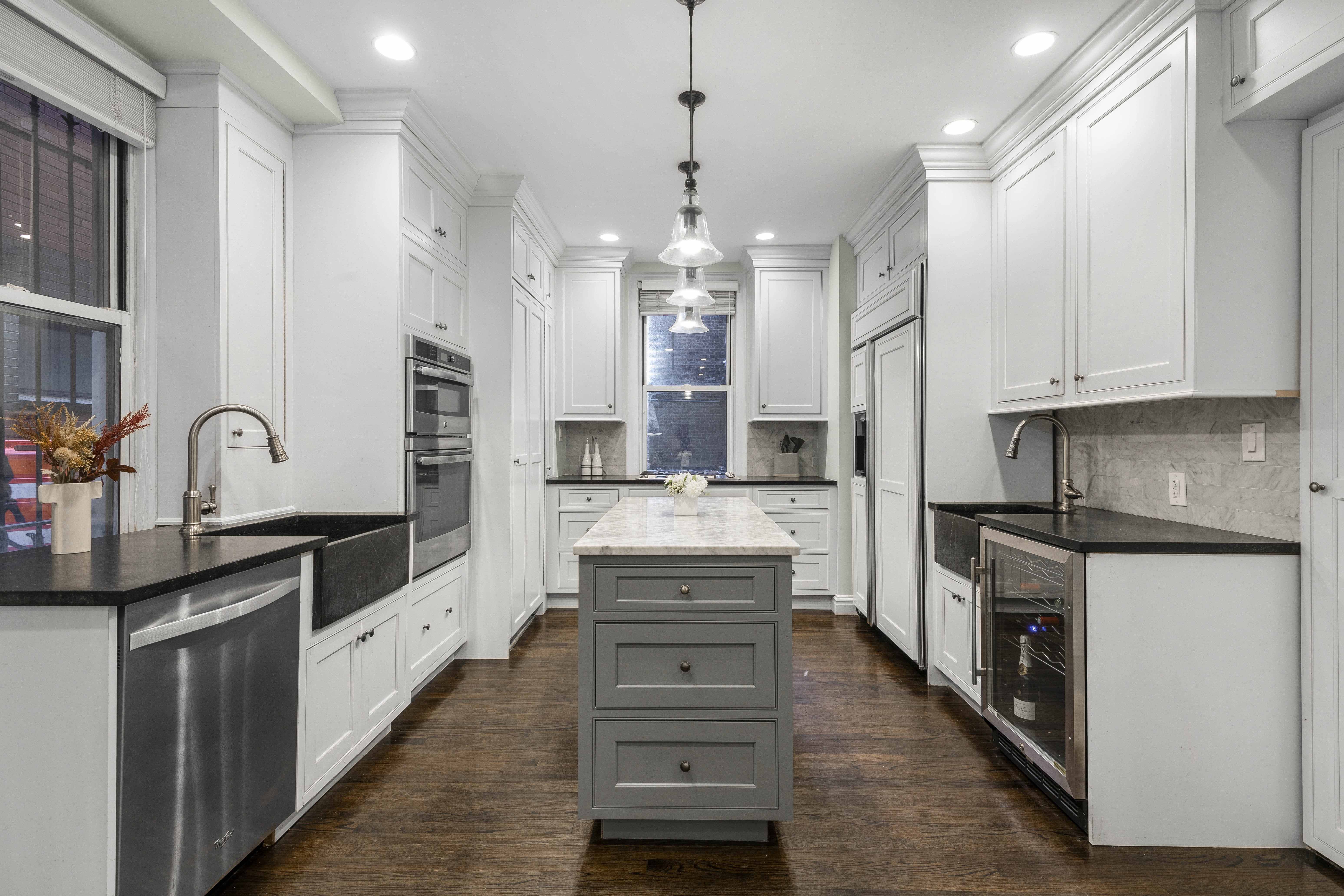Why Do Co-Ops Exist?
Co-op buildings are a specific type of housing that offers unique benefits to homeowners. Although you can find co-ops in metro areas all over the country, they are especially prevalent in New York City and make up a significant portion of the housing market in Manhattan.
These buildings offer unique benefits and often come at a lower price compared to condo buildings, they also come with strict rules and restrictions that may not be for everyone. To help you decide if this type of building is right for you, here is a look at why co-ops exist and everything you need to know before purchasing.
What is a Co-Op Building in NYC?
Co-op is short for a cooperative apartment or housing cooperative, which refers to a building that is owned by a legal entity controlled by shareholders who live in the building. So if you are buying a co-op in NYC, you are not actually purchasing the space you live in the way you would with a condo or single-family home. Instead, you're buying shares in a corporation that owns the building, which comes with the right to occupy one of the units.
Think about it like owning stock in a business. Rather than owning the entire company, you own a smaller percentage of the business, along with the other shareholders, and receive certain privileges because of it. However, when you purchase a co-op, your investment also provides you with a place to live.

What's the Difference Between Co-Op and Condo Buildings?
Many people also want to know the difference between a co-op and another type of property in Manhattan - the condo. The main distinction is the way the ownership is structured.
Living in a co-op means you jointly own the entire building, along with the other shareholders, but don't own your individual unit. That means each owner has greater control over the business affairs of the building but may need to consult the board and other shareholders if they wish to make alterations to the unit they live in. Due to the collaborative nature of co-op buildings, they tend to be more selective with the applicants they approve and often feature a lengthy application process. However, they also tend to be cheaper than condos of comparable quality.
With a condo, you own a single unit in a larger building and have the same rights and privileges that come with ownership in any type of real property. As a result, condo owners often have more control over their residence but may not have as much control over the entire building. You don’t have much say over who can and can’t purchase a unit in your building or how the board manages the property. But at the same time, the board and other homeowners don’t have as much say over what you do in your own unit as well and you’ll pay slightly more for that freedom.
What is the History of Co-Ops in NYC?
Cooperative apartments in New York City date back to the late 19th century. Different sources offer varying accounts of which was the first official housing co-op in NYC. However, the 1880s saw the development of several notable co-ops, including the Rembrandt on West 57th Street, the Gramercy at Gramercy Park, and the Dakota at West 72nd Street.
Co-ops became popular among wealthy New Yorkers who wanted spacious homes in a central location that offered more exclusivity than traditional apartment buildings. Throughout the 20th century, they became a vehicle for working-class residents to band together and create a community that made homeownership more accessible to the masses.
Manhattan co-ops in particular saw a resurgence in the '70s and ‘80s, as they offered a way for homeowners to combine resources and improve the living conditions of run-down apartment buildings in Midtown and other areas. Today, they are still very popular, and some of the most prestigious buildings in NYC are co-ops.

What Are the Pros and Cons of Owning a Co-Op?
The unique ownership structure co-ops offer provides interesting advantages that many people love. However, like any other type of real estate, purchasing a co-op in NYC has pros and cons. Here are a few of the major advantages and disadvantages of buying a co-op in New York.
Buying a Co-op Pros:
More Affordable: If you're debating buying a co-op vs. condo in NYC, price is a major advantage of the former. Co-ops typically cost about 10% less than condos of a similar size in a comparable location.
More Say Over the Building: Another significant benefit of living in a co-op is the ability to elect the board of directors that governs the building. This privilege gives you greater control over the business affairs and goings-on in the building.
A Strong Sense of Community: Due to the collective nature of co-op housing, it tends to feature a stronger sense of community compared to condos and apartment buildings. Your neighbors are not only the people you live next to; they're also your business partners, which tends to lend itself to more engagement and personal relationships among residents.
Buying a Co-op Cons:
Long Application Process: Co-op apartments in NYC tend to have a lengthy application process that includes tons of paperwork and board interviews. As a result, it can take longer to close, and you may be asked to divulge all kinds of information about yourself that may feel invasive if you aren't mentally prepared.
More Rules and Restrictions: Co-ops tend to feature far more rules and restrictions than condos. Any major alterations to your unit will need to be approved by the board, which means you can't just decide to paint the walls or put in new carpeting unless you ask permission. Plus, other shareholders have more leverage to complain to the board if you do something they don't like, such as throw frequent parties or invite people to stay with you for an extended period.
High Fees and Less Flexibility: Although the purchase price of a co-op for sale tends to be lower than that of a similar condo, it also usually features more costly maintenance fees. Plus, co-op boards tend to be less flexible with applicants who don't have a strong financial profile due to inconsistent employment history or lack of savings.
What Are Some Famous NYC Co-Ops
Some of the most famous and prestigious buildings in NYC are Manhattan co-ops offering spacious homes and gorgeous views of the city. Here are a few of the most famous co-ops in New York.
- River House: Located at 435 East 52nd Street, River House is a 26-story Art-Deco-style co-op with some of the strictest application standards in the city that has been home to notable residents such as Uma Thurman and Henry Kissinger.
- The Dakota: Often called the most famous apartment building in New York, the Dakota is a German Renaissance Revival style co-op situated at 1 West 72nd Street that's famous for being the former residence of John Lennon and Yoko Ono, as well as countless other celebrities.
- 960 Fifth Avenue: One of New York's most prestigious addresses, 960 5th Ave is a luxury apartment building designed by Italian architect Rosario Candela that's known for being the home of A-list celebrities and billionaires.
Tips for Finding a Co-Op
- Make sure you have plenty of savings and cash ready to spend. Most co-ops require a minimum 20% to 50% down payment, and some of the more exclusive buildings don't allow financing at all, which effectively means cash purchases only. Plus, you'll need to show an acceptable debt-to-income ratio with ample savings to fall back on.
- Check the requirements before you apply. The co-op application process can be long and grueling, so before you put yourself through all that, you'll want to be sure you stand a fighting chance.
- Assemble a qualified team. Buying a co-op is a bit more complicated than buying your standard condo or single-family home. So, you'll want to find a good real estate agent and legal representation who can help make the process more manageable.
Is it Worth Buying a Co-Op in NYC?
Buying a co-op in NYC certainly isn't for everyone. Many buildings have strict requirements, and applicants must be thoroughly vetted before they even get to the closing. The process is a bit more challenging and complicated than purchasing a standard home, and for those who are ill-prepared, it may feel overwhelming.
According to Undivided Founder Mukul Lalchandani, “Back in the day to make homeownership affordable, a concept of co-ops was created to make homeownership more accessible to the masses. Although still relevant, it is an outdated model for today’s consumer.
Co-op boards often abuse the way a co-op is operated, getting to decide who can be their neighbor, and may over-exert their power to control how the building is managed, sometimes to the detriment of the co-op community.
These days, many condo boards also act like co-ops, which goes against their fundamental purpose and difference to co-ops.”
Co-Ops do offer prime real estate at a discounted price and they make up a large percentage of the Manhattan real estate market. But you may end up paying the difference in maintenance fees and headaches when dealing with the board. So if you do decide to buy a co-op in NYC, make sure you understand the rules and find a building you’ll feel comfortable in for the long haul.
Need help finding the perfect co-op or condo? Reach out to our team today. Whether you need help finding the perfect co-op, condo, or any other residence, we’ll take the guesswork out of buying a home in NYC. Get in touch today to start your journey toward finding the ideal space.
Ready to Get Started?
Here's what you'll get:
✓ Curated Listings
We handpick properties that fit you, saving you time by showing homes that match what you want.
✓ Luxury Amenities
We highlight top-tier amenities so your new home delivers the prestige and quality you expect.
✓ Market insights
We provide detailed market comps and insights to guide your decision-making with confidence and clarity.


